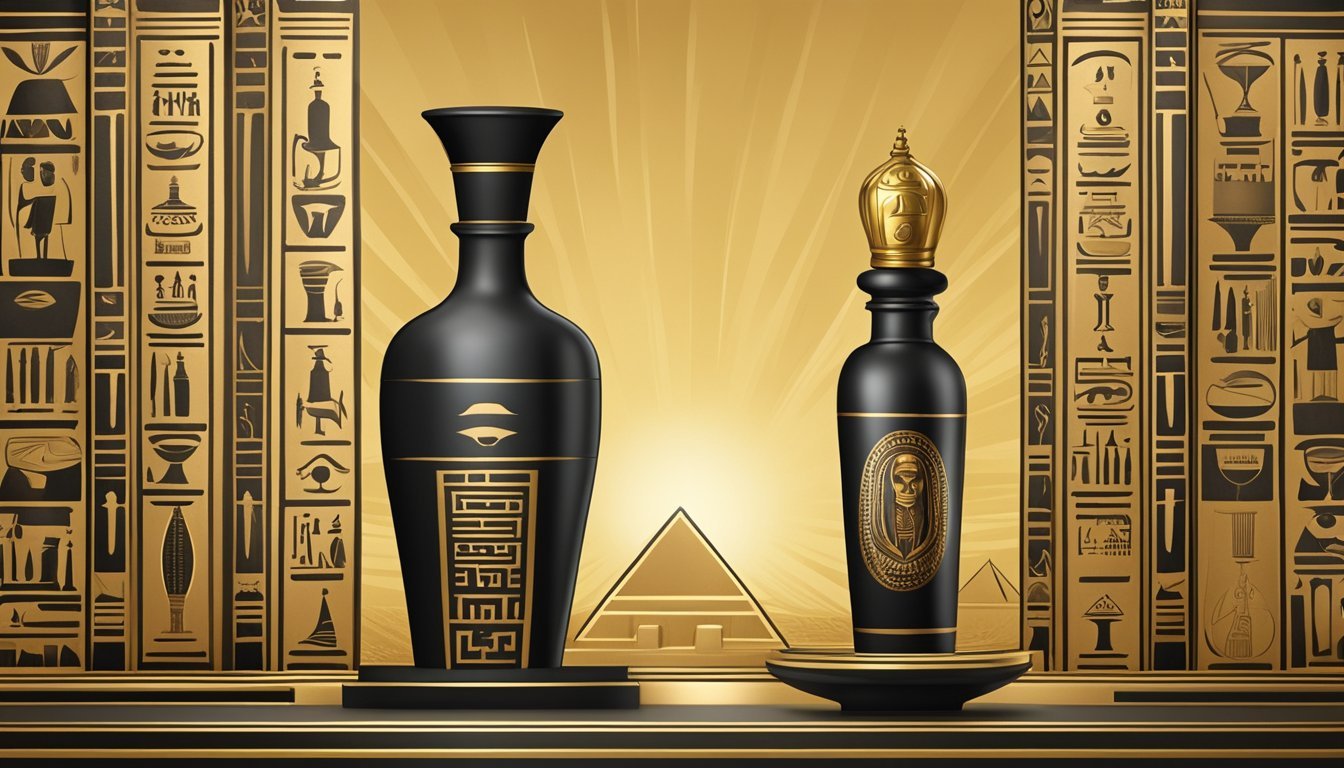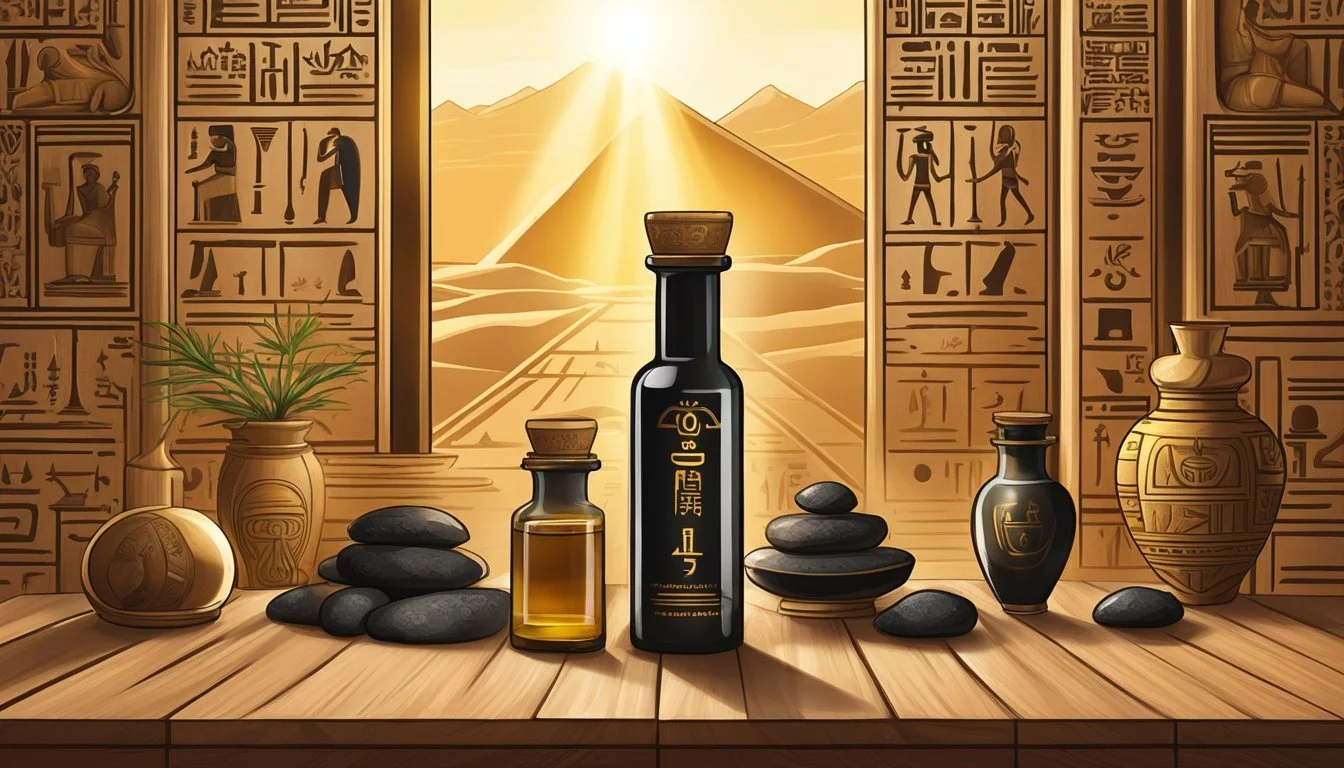Black Seed Oil
The Ancient Egyptian Secret Unveiled for Modern Health and Beauty Benefits
Black seed oil, extracted from the seeds of the Nigella sativa plant, has a storied legacy that dates back thousands of years to ancient Egypt. Renowned for its therapeutic properties, it was even discovered in the tomb of the legendary Pharaoh Tutankhamun, indicating its esteemed status in Egyptian culture. Treasured for both its health and beauty benefits, this oil has stood the test of time, continuously esteemed for its remarkable qualities that support well-being.
Echoed through ancient texts and artifacts, black seed oil was revered by Egyptians for its potent medicinal properties. Catering to a variety of ailments and cosmetic needs, it was incorporated into daily life as a natural remedy and a beauty elixir. Rich in antioxidants and anti-inflammatory compounds, this oil has been known to nourish the skin and hair, confirming the high regard ancient civilizations had for it as a cornerstone for health and beauty.
Today, black seed oil remains a highly valued natural product, playing a significant role in contemporary wellness and beauty regimens. Its multifaceted applications range from improving skin complexion to fostering hair strength, aligning with both historical uses and modern demands. The enduring popularity of black seed oil substantiates its credentials as a natural product with comprehensive health and beauty advantages, tracing its roots back to ancient Egyptian wisdom.
Black seed oil, celebrated for its diverse benefits, has been cherished for centuries for its remarkable contributions to wellness. This versatile oil has been an integral part of traditional wellness practices, valued for its ability to promote overall well-being. When combined with ginseng, plantain leaf, and seaweed, black seed oil offers a holistic approach to supporting health, reflecting its enduring appeal in ancient and modern wellness traditions.
Furthermore, the addition of cinnamon, cranberries, and valerian further complements the potential health benefits of black seed oil, contributing to its reputation as a versatile and effective natural remedy. Additionally, the incorporation of shea butter into skincare practices alongside black seed oil has expanded the spectrum of potential wellness benefits, underscoring the enduring appeal of this remarkable oil.
In conclusion, black seed oil continues to be celebrated for its positive impact on wellness, offering a natural solution for promoting overall well-being. Whether used topically, ingested, or incorporated into wellness routines, black seed oil remains a symbol of traditional wellness and natural health practices, embodying a rich heritage of botanical exploration and holistic wellness.
Historical Significance of Black Seed Oil
Black Seed Oil has been valued for its therapeutic properties since ancient times, with a notable presence in Egyptian culture and recognized by historical figures for its health and beauty benefits.
Black Seed Oil in Ancient Egyptian Culture
In Ancient Egypt, Black Seed Oil was not just a commodity; it was a vital ingredient used for its healing properties. Archaeological evidence shows that it was one of the key items placed in the tomb of Pharaoh Tutankhamun, indicating its importance in the afterlife. The Egyptians utilized Black Seed Oil for a range of applications, from mummification to daily skincare routines. It was revered for its ability to soothe inflammation and treat ailments of the skin, reflecting a deep understanding of its benefits that transcends centuries.
Famous Figures and Black Seed Oil
Historical records suggest that Cleopatra, known for her striking beauty and sharp intelligence, also leveraged the benefits of Black Seed Oil. She incorporated it into her skincare regimen, capitalizing on its moisturizing and anti-inflammatory properties. Moreover, the oil was recognized by scholars like Al-Biruni, underlining its use in traditional medicine. These endorsements by renowned figures highlight the long-standing trust in Black Seed Oil's efficacy for health and beauty.
Understanding Black Seed Oil
Black Seed Oil, derived from the Nigella sativa plant, is a treasured natural remedy with a multitude of health and beauty applications. Its efficacy can be attributed to a complex blend of phytochemicals, with thymoquinone being a notable bioactive component.
Nigella Sativa: The Source Plant
Nigella sativa, commonly known as black cumin or black seed, is an annual flowering plant belonging to the Ranunculaceae family. The plant is native to South and Southwest Asia and produces fruits with tiny, black, crescent-shaped seeds that are the source of Black Seed Oil.
Key Components of Black Seed Oil
Thymoquinone: The primary active compound possessing antioxidant and anti-inflammatory properties.
Phytochemicals: Black Seed Oil contains a spectrum of bioactive compounds beneficial for health, including:
Alkaloids
Flavonoids
Antioxidants
Bioactive Compounds: Besides thymoquinone, Black Seed Oil is rich in various other bioactive compounds that contribute to its therapeutic profile.
Extraction and Production Methods
The extraction of Black Seed Oil typically involves two main methods:
Cold Pressing: A mechanical method preserving the oil's nutrients without the use of heat.
Solvent Extraction: A method that may involve the use of chemicals, although it's less preferred due to possible residue in the oil.
Each method influences the quality of the final product, with cold pressing being the more traditional and typically preferable process to retain the full array of Black Seed Oil's natural constituents.
Health Benefits and Medical Uses
Black Seed Oil has garnered attention for its potential health benefits and medicinal uses, which are backed by both historical anecdotes and emerging scientific research. It is often associated with immune support, anti-inflammatory effects, and an array of benefits targeting skin conditions and chronic diseases.
Black Seed Oil and Immune System
Black Seed Oil is believed to bolster the immune system. It exhibits antimicrobial and antiviral properties that may assist in defending against various pathogens.
Black Seed Oil Impact on Inflammation and Autoimmune Diseases
The oil contains thymoquinone, an active compound with anti-inflammatory qualities. This may be beneficial in managing autoimmune conditions by modulating the body's immune response.
Efficacy for Skin and Hair Conditions
Rich in antioxidants, Black Seed Oil helps to soothe skin conditions like eczema and psoriasis, and combat acne. Its moisturizing effects contribute to its use in promoting hair growth and scalp health.
Heart Health and Blood Pressure Regulation
Research has suggested that Black Seed Oil may have a positive effect on heart health, including aiding in blood pressure regulation due to its potential vasodilatory effects.
Blood Sugar and Diabetes Management
Black Seed Oil has been studied for its ability to help with blood sugar regulation, an important consideration for managing diabetes.
Weight Management and Digestion
Anecdotal evidence indicates that Black Seed Oil could support weight loss efforts and assist in digestion, potentially helping to alleviate bloating and other digestive issues.
Fertility and Other Benefits
Black Seed Oil has been traditionally used to boost fertility in both men and women, though more research is needed to conclusively determine its effectiveness for these purposes.
These subsections highlight the multifaceted potential of Black Seed Oil in health and medical applications, demonstrating its versatility and the wide span of conditions it may positively influence.
Application and Usage
Black Seed Oil offers versatility in its applications, serving as both a health supplement and a beneficial ingredient in skin and hair care products. Its incorporation into diets and daily routines can yield various health and beauty benefits.
How to Use Black Seed Oil as a Supplement
To consume Black Seed Oil as a supplement, it's recommended to take it in small doses, generally between one to two teaspoons daily. Users may mix it with honey or lemon juice to enhance the taste. This supplement is rich in essential fatty acids, which play a crucial role in maintaining one's health.
Black Seed Oil in Skincare and Haircare Routines
When used in skincare, Black Seed Oil can be directly applied to the skin or mixed with a carrier oil. It is known for its moisturizing and anti-inflammatory properties, aiding in reducing acne and soothing skin conditions like eczema or psoriasis. In hair care, the oil can be massaged into the scalp to strengthen hair follicles and promote growth.
Culinary Uses of Black Seed Oil
Black Seed Oil can also be used in food preparation. Its flavor, reminiscent of a combination of onions, black pepper, and oregano, makes it a unique addition to salads, soups, or as a seasoning for meats. However, it should be used sparingly due to its potent taste and properties.
Other Forms: Capsules, Gel, and Lotion
Apart from liquid oil, Black Seed Oil is available in alternative forms like capsules, gels, and lotions. Capsules offer a simple way to take the oil as a dietary supplement, while gels and lotions can be topically applied to skin and hair, providing the same benefits in a more convenient form.
Potential Side Effects
While black seed oil is heralded for its health benefits, it's critical to be aware of the potential side effects that may occur with its use.
Understanding Possible Adverse Reactions
Although considered safe for most people when used in moderation, black seed oil can cause adverse reactions in some individuals. Reported side effects include:
Digestive issues: Nausea and bloating are common side effects, especially when consumed in high amounts.
Allergic reactions: Skin rashes and allergic reactions can arise in individuals sensitive to Nigella sativa.
Hypotensive effect: Overconsumption may lead to blood pressure lowering beyond desired levels.
Interactions and Contraindications
Black seed oil may interact with certain medications and health conditions:
Medication interactions: It may potentiate the effects of medications for blood pressure, blood thinners, and immune suppressants.
Pregnancy and breastfeeding: Its use is not recommended due to potential risk of contractions and insufficient research on safety.
Existing health conditions: Individuals with bleeding disorders, low blood pressure, or upcoming surgery should avoid using black seed oil.
Safe Dosage and Administration
Establishing a safe dosage is crucial to reducing the risk of side effects:
Adults: A typical dose of 1 teaspoon (5 mL) per day is usually tolerated well.
Topical use: For skin application, diluting the oil and performing a patch test is recommended to ensure safety.
Quality Control and Purchasing Tips
When seeking out Black Seed Oil, a discerning buyer must prioritize quality, purity, and authenticity. Ensuring the absence of unnecessary preservatives and adherence to organic standards can significantly impact the oil's benefits for health and beauty.
Identifying High-Quality Black Seed Oil
High-quality Black Seed Oil should possess a deep amber color and a characteristic spicy aroma. It should be extracted using cold pressing methods to maintain its natural constituents. The oil should ideally be virgin, meaning it's processed without high heat or chemical solvents which may degrade its nutritional profile.
Understanding Labels and Certifications
Consumers should look for labels that indicate organically grown sources of Nigella Sativa seeds. Certifications from reputable organizations, such as the USDA Organic or Non-GMO Project, serve as indicators that the product meets stringent purity standards. Third-party testing badges can also affirm its quality.
Preservatives and Purity Concerns
A commitment to purity means that Black Seed Oil should be free of synthetic preservatives. Read ingredient lists carefully; ideally, the only ingredient should be 100% pure Nigella Sativa oil. Some manufacturers may add natural preservatives like vitamin E, which can also help extend the shelf life of the oil without compromising its integrity.






